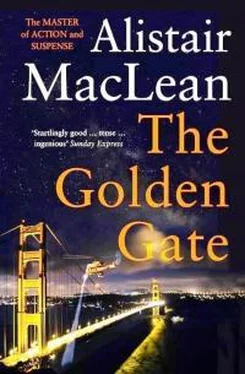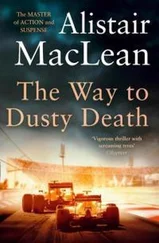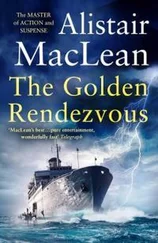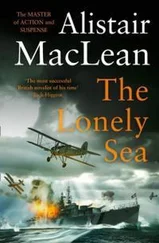Revson was in the window seat by the time April Wednesday came in. She hesitated, then sat down beside him. She said: ‘And why do you want my seat? I thought it was customary for the lady to be offered the inside seat.’
‘To keep her from falling into the aisle during the night? Don’t you know this is the golden age of women’s lib? However, that’s not my real reason. Is it possible for me to reach the aisle without disturbing you in the process?’
‘That’s a silly question.’
‘Is it? I mean, possible?’
‘You can see it isn’t.’
‘Would you be prepared to swear – short of thumb-screws, that is – that I never once disturbed you in the course of the night?’
‘You propose to disturb me, then?’
‘Yes. Will you?’
She smiled. ‘I think I’ve shown that I can lie with the best of them.’
‘You’re not only beautiful, but you’re good.’
‘Thank you. Where were you thinking of going?’
‘Do you really want to know? I think you’d better not. Think of the thumb-screws, the rack, being broken on the wheel–’
‘But Chief of Police Hendrix said that Branson never offered violence to women.’
‘That was the Branson of yore. But he’s become jittery now, more than a little rattled. He might find himself driven to a point where he’s compelled to abandon his scruples.’
It wasn’t the completely sodden thin silk dress she was wearing that made her shiver. ‘I think I’d rather not know. When are you–’
‘Just before midnight.’
‘Then I shan’t sleep a wink before then.’
‘Excellent. Give me a shake at five minutes to.’ Revson closed his eyes and appeared to relax comfortably in his seat.
By five minutes to midnight everyone in the coach appeared to be asleep: despite their cold and discomfort nearly all had been asleep for over an hour. Even April Wednesday was asleep, her head on Revson’s shoulder, huddling close to him for warmth. She was quite unaware of this. Even the guard, Bartlett, almost certainly because Kowalski’s prowling figure was no longer there to keep him on the qui vive, was much nearer sleep than wakefulness, his head nodding on his chest, only occasionally, and with longer intervals in between, jerking his head upright. Only Revson, his eyes closed, was as awake and alert as a cat on a midnight prowl. He nudged April and whispered in her ear. She started awake and looked at him, her eyes uncomprehending.
‘Time to go,’ he said softly. It was almost dark inside the coach, the only illumination coming from the dimmed light over the driver’s seat and from the lights of the bridge itself. ‘Give me the aerosol.’
‘The what?’ Suddenly she was wide awake, the white of the smudged eyes – the pupils could have been any colour – huge in the gloom. ‘Of course.’ She reached under her seat and brought up the aerosol can. Revson tucked it in his inside left coat pocket. She said: ‘How long will you be?’
‘With luck, twenty minutes. Perhaps half an hour. I’ll be back.’
She kissed him lightly on the cheek. ‘Please take care.’
Revson had no comment on this highly unnecessary advice. ‘Move into the aisle. Quietly as you can.’
He passed by her and moved silently forwards, his white pen in his hand. Bartlett’s head was on his chest. Revson pressed the button at a distance of less than a foot and the needle lodged behind Bartlett’s left ear. Revson eased him back until his head dangled over the back of his seat. The drug, apart from inducing unconsciousness, had a temporarily paralysing effect so there seemed little enough likelihood that Bartlett would slip off his seat. April watched all this without any expression: the only indication of her feelings was the tip of a tongue that sought to moisten dry lips.
There had to be a patrolling guard, Revson knew – he had, in fact, seen him several times – and he had to be taken care of. He peered cautiously through the open driver’s doorway. A guard was indeed approaching, coming up from the south, walking a few feet wide of the coaches and carrying a shoulder-slung machine-carbine. Revson thought he recognized him as Johnson, one of the helicopter pilots, but couldn’t be sure. Revson switched off Bartlett’s dimmed light and remained where he was. He had the aerosol can in his hand but at the last moment changed his mind and brought out the pen instead. A person recovering from the effects of the knock-out needles invariably awoke none the worse for his experience and usually assumed that he had just dropped off to sleep: but as Revson could tell from his own experience of that morning, a person awakening from a gas knock-out felt nauseated and thoroughly hung over and under no illusion at all that he had been anaesthetized in one way or another. It didn’t seem a good idea to have Johnson report this to Branson.
Revson pressed the button and jumped down at the same instant to catch Johnson before he keeled over on to the roadway, less for humanitarian reasons than to prevent the metallic sound of the carbine striking the roadway. He removed the needle from Johnson’s forehead, hauled him as silently as possible inside the coach and jammed him in a very uncomfortable position in front of the driver’s seat. Johnson was in no position to feel any discomfort and Revson didn’t want to risk the possibility of any passenger awakening – highly unlikely though it seemed – and finding an unconscious stranger lying in the aisle.
April Wednesday had gone back to her lip-licking.
Revson emerged by the nearside front door. In the bright lights of the bridge he might almost as well have stepped out into daylight. He had no doubt that his activities were being carefully watched from both north and south shores through powerful night glasses, but that was of no concern. What mattered was that he was effectively shielded from the other two coaches, though he seriously doubted whether there was anyone keeping watch in either or, indeed, whether anybody at all was awake. In point of fact both Van Effen and Chrysler were talking quietly to each other in the rear coach, but it was impossible for them to see Revson.
Revson crossed the crash barrier, pulled himself to the rail and peered down. Below, all was total blackness. The submarine could or could not have been there: he just had to hope it was.
He descended and pulled the oil-skin container from under the coach. Inside was the fishing line and a weighted lab. sample canister – weighted, because the wind was still gusting and he had to be sure that the line descended reasonably vertically.
He cut off hooks and lures at the end of the fishing line and attached the canister to the line. He eased the canister over the side and started unwinding the line from its square wooden framework. After about thirty seconds of this he stopped, held the line delicately between forefinger and thumb and waited for some sort of acknowledging tug. There was none. He lowered it another ten feet. Still no answering tug. Perhaps the submarine wasn’t there, perhaps the captain was finding it impossible to maintain position because of the tides and strong currents. But then Admiral Newson had said that he knew just the very man who could do just that and it was unlikely that a man of Newson’s reputation would make any mistake. Revson lowered the line another ten feet then sighed aloud with relief when he felt two sharp tugs on the line.
Twenty seconds later there came another two sharp tugs. Revson overhanded the line in with all possible speed. When he estimated there were only a few feet of line left he leaned far out and pulled in at a much slower speed. He had no wish to bang the radio, however gently, against the steelwork of the bridge. Finally, he had it in his hand, a waterproof bag with the line securely fixed round its neck. He descended to the side of the bus to examine his catch. He cut the securing line with his knife and peered inside. There it was – a tiny gleaming transistorized transceiver.
Читать дальше
Конец ознакомительного отрывка
Купить книгу












